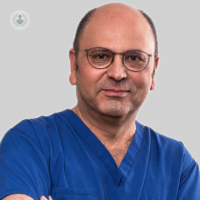What are the chances of IVF working first time?
Written in association with:For couples struggling to have a baby due to infertility, in vitro fertilisation (IVF) is an option many look to. While it raises the couple’s chance of conceiving, there is no guarantee that it will successfully result in the birth of a baby. So, what exactly are the chances of IVF working first time, and why do treatment cycles fail? Leading fertility specialist Dr Benjamin Abramov is here to explain.

What is the chance of a single in vitro fertilisation (IVF) treatment cycle resulting in a birth of a baby?
IVF success rates are age-related. Figures were obtained from cycles carried out across the USA in 2010, which suggested that the chances of having a baby from a single IVF treatment cycle in women of different ages were as follows:
- < 35 – approximately 40%.
- 36-38 – approximately 30%
- 38-40 – approximately 20%.
- 40-42 – only 10% of cycles ended with a baby.
- 42-44 – 5% of cycles ending with a live birth.
At the age of 45 any given treatment cycle had only 1% chance in resulting in a birth of a baby.
Why do so many IVF treatment cycles fail?
Unlike men, who produce sperm throughout their lifetime (and therefore may only expect a moderate age-related drop in their fertility), women are born with a fixed reservoir of their eggs. This reservoir is subject to two processes which affect the chances of pregnancy.
Firstly, the number of eggs in this reservoir depletes constantly from birth onwards. This decline in the number of eggs is not hormone-dependent and is not affected by pregnancies, fertility treatment or by the use of oral contraceptive pills. In fact, the most significant drop in this reservoir of eggs occurs between birth, when a baby girl is estimated to have around 2 million eggs, and puberty, when the estimated number is around 300,000-500,000.
The second process that affects eggs is that they age throughout a women’s reproductive life span. This aging process makes the eggs more likely to produce an embryo with an abnormal makeup of chromosomes.
Both these processes – the decline in the number of eggs and the drop in their chromosomal quality through ageing – seems to speed up for women in their mid-thirties and onwards.
IVF treatment depends heavily on both the number of eggs that the doctors manage to mature and retrieve by the use of fertility drugs (with 10-15 eggs regarded as the optimal number) and on the quality of the eggs retrieved.
A significant proportion of all embryos produced during IVF treatment carry an abnormal makeup of chromosomes. Such embryos will not implant, or may implant but then result in a miscarriage. Occasionally, such embryos result in an ongoing pregnancy with a prenatal diagnosis of anomalies leading to a termination or the birth of a child with a serious disability. Pre-implantation genetic screening (PGS) can be used to examine the chromosomes of the embryos and determine which are viable for implantation.
The best chances of success
The younger a woman is, the more likely it is that a higher majority of her embryos will have a normal makeup of chromosomes. Additionally, when a woman has a good reservoir of eggs, the fertility specialists are more likely to retrieve a good number of eggs in an IVF treatment cycle and subsequently, they are more likely to end with a higher number of embryos. A higher number of embryos created translates into a better chance that at least one of them will have a normal makeup of chromosomes to allow a live birth of a healthy child.


